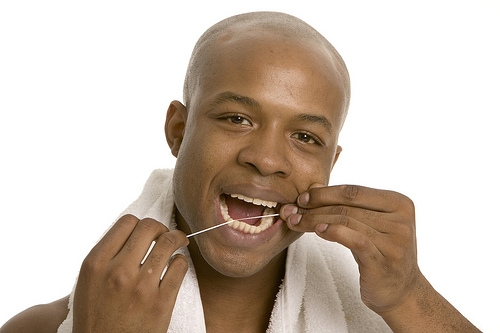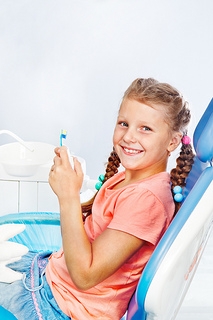December 14th, 2016

At Clark Jones, DDS, MSD, we prefer our patients to practice good oral hygiene between office visits. Part of that process includes flossing, which Dr. Jones will tell you, is the process of cleaning between the teeth to remove food and debris from the areas that are hard to reach with a toothbrush. When food is allowed to remain between the teeth, it provides a breeding ground for bacteria, which can cause periodontal disease.
Should you floss before or after brushing?
You can floss either before or after brushing, according to your own preference. By flossing first, you can brush away dislodged food debris afterward. On the other hand, brushing first allows you to loosen plaque between the teeth, making it easier to floss more effectively.
Whichever you choose, the most important goal is to floss thoroughly. That means using a fresh strand of dental floss each day, and carefully pulling it back and forth between all of the teeth. Do not skip flossing because your teeth look or feel clean.
When to Floss
Unlike brushing, you need only floss between your teeth once per day. Although you may choose to do it in the morning or afternoon, many prefer to floss at night to prevent food and debris from remaining in the crevices of the teeth overnight. This could prevent the build-up of plaque too, which is a cause of tooth decay.
Help with Flossing
If you have questions about your flossing technique or what type of floss is best for your teeth, contact our office. Our staff will be more than happy to assist you in perfecting your home hygiene regimen. In most cases, you can choose between interdental cleaning picks or flexible floss strands to perform your daily flossing routine. If you have permanent oral appliances or restorations, be sure to follow the flossing instructions provided to you, and contact our Phoenix, AZ office with any questions.
November 30th, 2016

Not many people look forward to going to the dentist, especially if you already know that you need dental work done. A small amount of anxiety is one thing, but dental phobia, or odontophobia, is something else entirely. It is an irrational fear of going to the dentist. If you have it, you might be unable to force yourself to go to the dentist, even if you are suffering from bad tooth pain. The effects of dental phobia can be serious, but there are ways to overcome your fear of the dentist to help you achieve and maintain good oral health.
Causes of Dental Phobia
You can develop dental phobia for a variety of reasons, including the following.
- Fear of pain, which you might acquire based on others’ horror stories of their trips to the dentist.
- Fear of needles, such as those used to provide anesthesia.
- A previous bad experience, when something went wrong and pain was intolerable.
- Lack of control from not knowing what is happening or how uncomfortable a procedure might be.
Consequences of Dental Phobia
Avoiding the dentist can have long-term consequences. When caught early, tooth decay is easily stopped with a minor filling. If you let the decay go, you can end up losing your tooth and have chronic pain. A dentist can also check for early signs of gum disease, which, if left untreated, could lead to losing one or more teeth.
Even if you do not have a particular problem, going to a dentist for regular cleanings is a good idea because the hygienist can point out where you need to brush better and remove the plaque from your teeth.
Getting Over Fear of the Dentist
Most patients with dental phobia can get over their condition. These are some approaches that Dr. Jones and our team recommend:
- Explain each step of the process
- Let you know that you can stop the procedure at any time
- Encourage you to come with a family member or friend
- Help you with deep breathing techniques
November 16th, 2016

At Clark Jones, DDS, MSD, we have been creating beautiful smiles for years. Whether you or your family have visited Dr. Jones and our team for a single visit or have been loyal patients throughout the years, we would love to hear your thoughts about your experience! In fact, we encourage you to leave a few words for us below or on our Facebook page!
We look forward to reading your feedback!
November 9th, 2016

Parents usually have numerous questions about orthodontic treatment for their children. According to the American Association of Orthodontists, orthodontic treatment for children should start at around seven years of age. This allows Dr. Jones to evaluate the child’s existing and incoming teeth to determine whether or not early treatment might be necessary.
What is early orthodontic treatment?
Early orthodontic treatment, known as Phase One, usually begins when the child is eight or nine years old. The goal is to correct bite problems such as an underbite as well as guide the jaw’s growth pattern. It also helps to make room in the mouth for the permanent teeth to be properly placed as they come in. This will greatly reduce the risk of the child needing extractions later in life due to his or her teeth getting crowded.
Does your child need early orthodontic treatment?
There are several ways that you can determine whether your child needs early treatment. If you observe any of these characteristics or behaviors, you should talk to Dr. Jones.
- Early loss of baby teeth (before age five)
- Lat loss of baby teeth (after age five or six)
- The child’s teeth do not meet properly or at all
- The child is a mouth breather
- Front teeth are crowded (you won’t see this until the child is about seven or eight)
- Protruding teeth, typically in the front
- Biting or chewing difficulties
- A speech impediment
- The child’s jaw shifts when he or she opens or closes the mouth
- The child is older than five years and still sucks a thumb
What are the benefits of seeking orthodontic treatment early?
Early orthodontic treatment is begun while the child’s jaw bones are still soft. They do not harden until the children reach their late teens. Because the bones are still pliable, corrective procedures such as braces work faster than they do for adults.
In short, early treatment at our Phoenix, AZ office often allows your child to avoid lengthy procedures, extraction, and surgery in adulthood. Early treatment is an effective preventive measure that lays the foundation for a healthy, stable mouth in adulthood.





